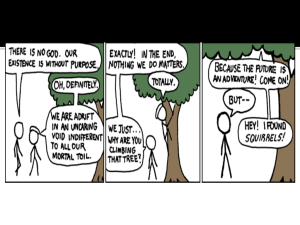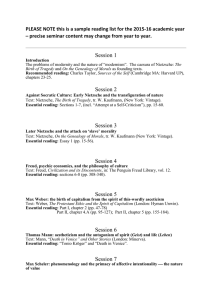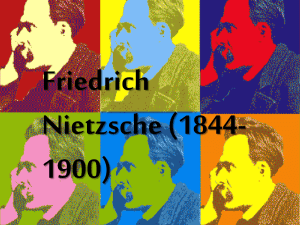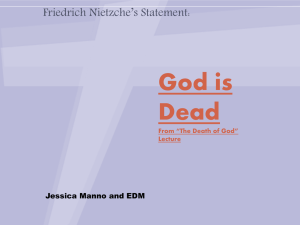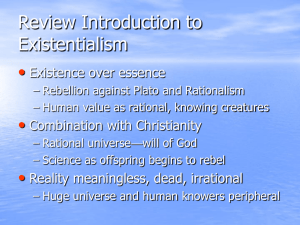Presentation on Gemes on Nietzsche`s Critique of Truth
advertisement
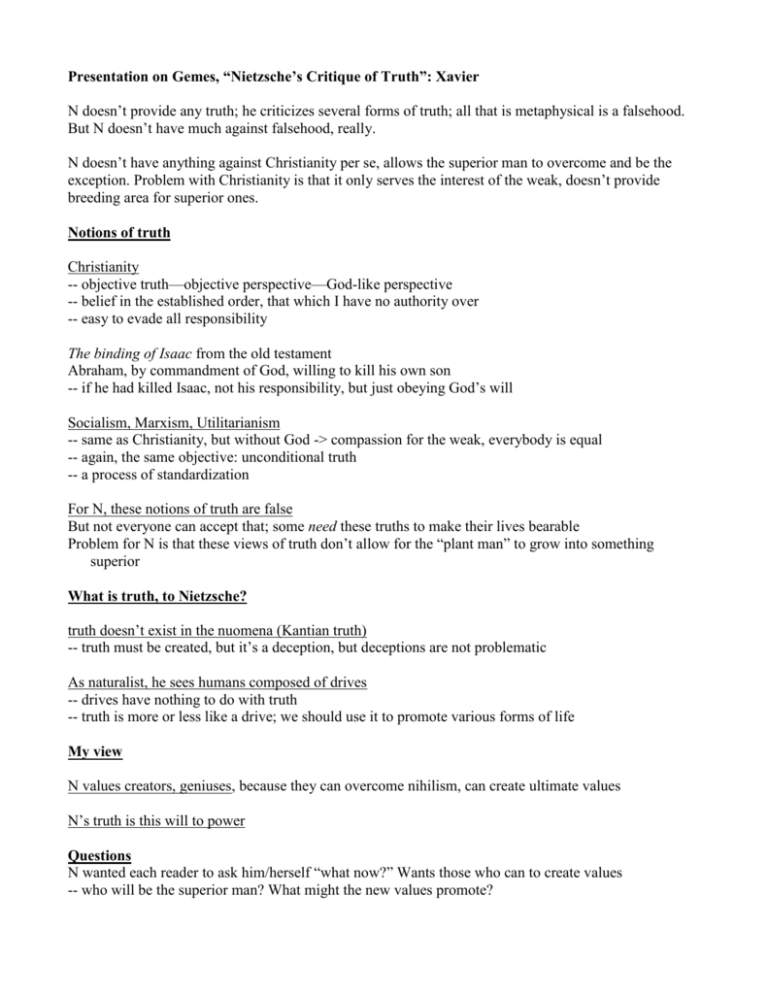
Presentation on Gemes, “Nietzsche’s Critique of Truth”: Xavier N doesn’t provide any truth; he criticizes several forms of truth; all that is metaphysical is a falsehood. But N doesn’t have much against falsehood, really. N doesn’t have anything against Christianity per se, allows the superior man to overcome and be the exception. Problem with Christianity is that it only serves the interest of the weak, doesn’t provide breeding area for superior ones. Notions of truth Christianity -- objective truth—objective perspective—God-like perspective -- belief in the established order, that which I have no authority over -- easy to evade all responsibility The binding of Isaac from the old testament Abraham, by commandment of God, willing to kill his own son -- if he had killed Isaac, not his responsibility, but just obeying God’s will Socialism, Marxism, Utilitarianism -- same as Christianity, but without God -> compassion for the weak, everybody is equal -- again, the same objective: unconditional truth -- a process of standardization For N, these notions of truth are false But not everyone can accept that; some need these truths to make their lives bearable Problem for N is that these views of truth don’t allow for the “plant man” to grow into something superior What is truth, to Nietzsche? truth doesn’t exist in the nuomena (Kantian truth) -- truth must be created, but it’s a deception, but deceptions are not problematic As naturalist, he sees humans composed of drives -- drives have nothing to do with truth -- truth is more or less like a drive; we should use it to promote various forms of life My view N values creators, geniuses, because they can overcome nihilism, can create ultimate values N’s truth is this will to power Questions N wanted each reader to ask him/herself “what now?” Wants those who can to create values -- who will be the superior man? What might the new values promote? -- What do you think of the idea that N’s view if truth is that it is will to power, will to create? -- For you, what is truth, to Nietzsche? How did you understand it? Or is there any at all? -- If truth doesn’t exist, why must it be created? Why do we need narratives? What value do they have? Can we live with no ultimate value? Can we live in a nihilistic age? Class discussion N’s own statements about will to power, naturalism, need to have strong wills, etc., are put forth as true statements. Does he seem to be presenting them as objective truths? -- N not saying we should find a new theory that is objectively true. Asking why we have this will to that sort of truth, not saying we should stick to it -- if think this will to truth is no longer valuable for us, then do something else -- accept the sort of truth we can have as a human, in this life, and move forward from there Do we really want to agree that N’s idea of a strong person is the sort of person we should be aiming at? Could be something like a CEO who doesn’t care about others and just steps all over them to get to the top. What about psychopaths who overcome others by being ruthless? Maybe when N refers to objective truth, wouldn’t even think of it as applying to God because God has purposes, interests in commanding certain things like the telling Abraham to kill his son. What does nihilism really mean? -- feeling after we’ve realized that the moral values we’ve accepted are our own creation, not transcendentally grounded: what meaning do we have for life now? Truth for Nietzsche has to do with action in the world: if we can effect change in the world, not just in our own thoughts, beliefs, arguments -- also, there are drives, bodily needs, that exist even if we don’t think anything else is true, so we can test claims against these observations of the body and what’s helpful for life




